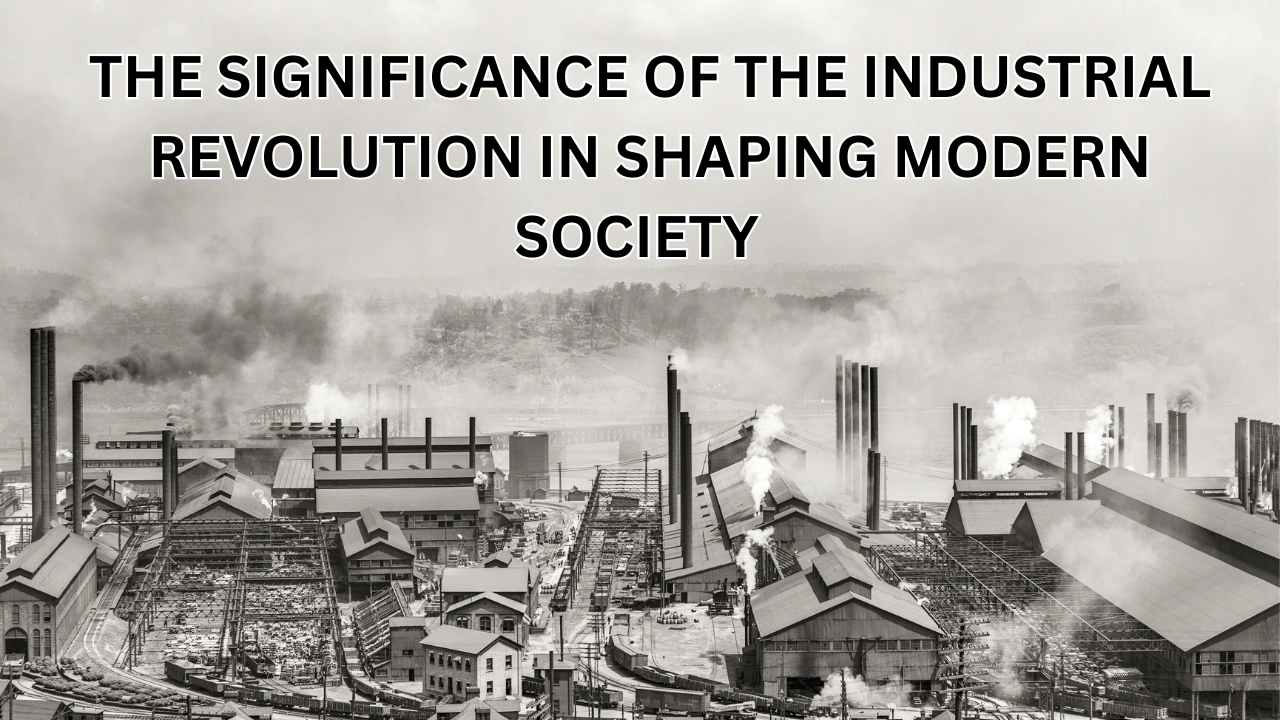The Industrial Revolution stands as one of the most transformative periods in human history fundamentally reshaping societies and laying the groundwork for the modern world beginning in the late 18th century it marked a shift from agrarian economies to industrialized and urbanized societies powered by technological innovation and mechanization this era brought profound changes in how people lived and worked fostering advancements in manufacturing transportation, and communication the rise of factories replaced cottage industries creating unprecedented productivity and introducing new social dynamics including urban migration and a working-class population the revolution impact extended beyond economics it revolutionized social structures education and global trade.
Urban centers grew rapidly fostering cultural exchange and innovation while also giving rise to challenges such as overcrowding and labor exploitation scientific progress flourished influencing fields like medicine engineering and agriculture the Industrial age improved living standards for many and widened the gap between the wealthy and the poor sparking discussions about social equality and labor rights that still resonate today the Industrial Revolution was a double-edged sword driving progress while posing ethical and environmental dilemmas its legacy continues to shape our globalized world’s technological economic and social fabric.
Economic Impacts of the Industrial Revolution:
The Industrial Revolution had a profound and lasting impact on global economies, fundamentally altering production methods trade, and labor systems at its core was the transition from manual agrarian-based production to mechanized manufacturing in factories which dramatically increased efficiency and output the rise of industries such as textiles steel and coal mining revolutionized local and international markets, creating a surge in economic growth and wealth generation nations that embraced industrialization particularly in Europe and North America experienced unprecedented prosperity establishing themselves as global economic powerhouses.
This transformation facilitated the development of capitalist economies where competition and innovation became driving forces the economic changes were not uniformly beneficial while industrialization created vast opportunities for entrepreneurs and business owners it also led to stark inequalities wealth became concentrated in the hands of industrial capitalists while many workers faced low wages unsafe working conditions and exploitative labor practices urbanization a byproduct of industrial growth created challenges like overcrowding, unemployment and poverty in rapidly expanding cities.
Social Impacts of the Industrial Revolution:
The Industrial Revolution brought profound social changes that transformed the structure and fabric of society influencing the way people lived worked, and interacted urbanization surged as millions migrated from rural areas to growing cities in search of jobs in factories leading to the rapid expansion of urban centers this shift disrupted traditional ways of life as agricultural communities gave way to bustling industrial cities marked by a new social dynamic the rise of the working class driven by factory labor reshaped societal hierarchies while the emerging middle class consisting of industrialist merchants, and professionals gained prominence and influenced economic growth the revolution brought significant social challenges.
Overcrowded living conditions in cities led to poor sanitation health crises and the spread of diseases long working hours low wages and dangerous factory environments sparked public outrage and eventually led to labor movements advocating for worker rights fair wages, and better working conditions at the same time industrialization fostered cultural shifts with increased access to education new forms of entertainment and the spread of ideas through improved communication systems.
Legacy of the Industrial Revolution:
The legacy of the Industrial Revolution is deeply embedded in the foundation of modern society shaping the technological economic and social landscapes we know today it marked the beginning of sustained industrial growth and innovation fostering a culture of invention that continues to drive progress in fields such as manufacturing transportation and communication the revolution advancements laid the groundwork for global urbanization creating dynamic cities that became centers of culture commerce, and political influence it also introduced the concept of mass production which revolutionized consumer goods making products more affordable and accessible to a broader population its legacy is not without complexity.
The Industrial Revolution initiated significant environmental challenges as the reliance on fossil fuels led to pollution and set the stage for climate change issues that still demand solutions today while it improved living standards for many and expanded opportunities for education and mobility it also exposed deep inequalities, prompting movements for worker rights and social justice that have continued to evolve its emphasis on industrialization spurred colonial expansion and exploitation leaving a mixed heritage of progress and disparity across the globe.
Creating New Social and Economic Problems:
While the Industrial Revolution brought significant advancements, it also gave rise to numerous social and economic problems that reshaped societies in challenging ways the shift to industrial economies created an urban working class many of whom endured grueling conditions in factories characterized by long hours low wages, and little regard for safety this exploitation led to widespread poverty and inequality as the wealth generated by industrial growth was concentrated in the hands of factory owners and capitalists leaving workers struggling to meet basic needs overcrowded cities hastily built to accommodate the influx of workers became hotspots for poor living conditions with inadequate sanitation rampant disease and limited access to clean water.
The revolution disrupted traditional systems, as small-scale artisans and rural farmers struggled to compete with the efficiency and scale of mechanized production this led to the decline of traditional industries and the loss of livelihoods for many, particularly in rural areas the rise of child labor became a grim reality as families sent young children to work in harsh environments to supplement meager incomes the introduction of new technologies also widened the gap between industrialized and non-industrialized nations fostering global inequalities that persist today these challenges underscored the darker side of rapid progress highlighting the need for reform and ethical considerations in the face of modernization.
